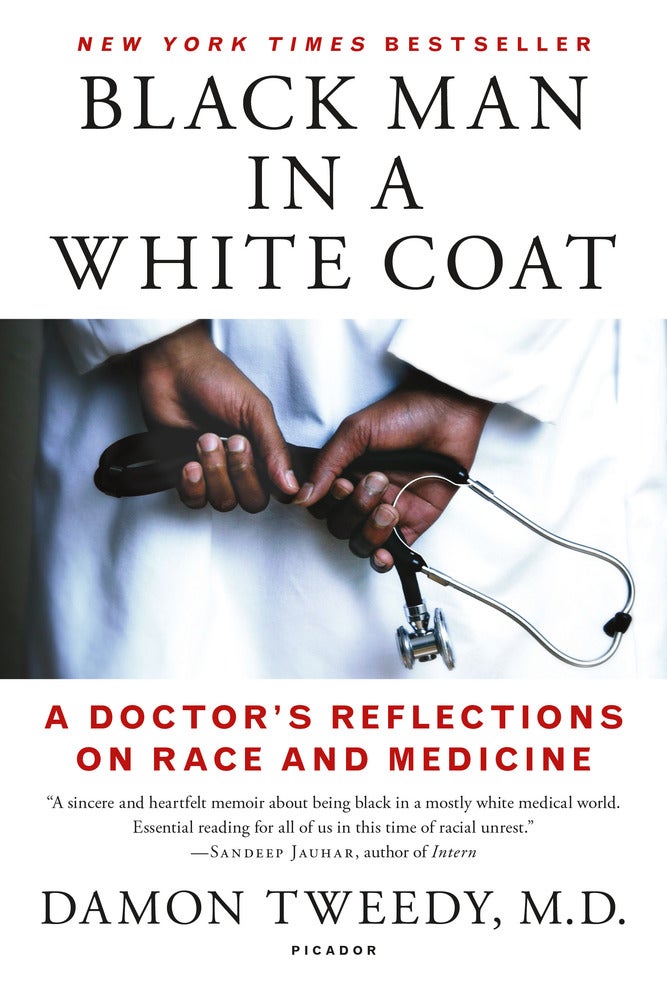ECU Jean Mills Symposium explores race and medicine during pandemic, protests
Defining moments of the year 2020 have exposed the impact of health disparities and how they are perpetuated in health care and medical education, says Dr. Damon Tweedy.
The Duke University psychiatrist and author of the New York Times bestseller, “Black Man in a White Coat” explored the impact of the pandemic and nationwide protests during the 16th annual Jean Mills Health Symposium on Oct. 30 and 31.

Duke University psychiatrist Dr. Damon Tweedy was the guest speaker during the virtual 16th annual Jean Mills Health Symposium held on Oct. 30. (Photos courtesy of Picador)
Tweedy’s virtual presentation, “Reflections on Race and Medicine in the Year of COVID-19 and Nationwide Protest,” attracted audiences from across ECU disciplines and the community.
“COVID and the national protests have transformed all our lives to different degrees, but I think when we take a closer look, there’s certain populations that have been affected much more,” Tweedy said.
COVID-19 revealed health disparities through the higher coronavirus diagnosis and mortality rates in minority populations. The virus, he said, is a reflection of the larger problems that exist in health care.
During his first year of medical school, Tweedy learned how deeply race permeated the medical field, from both patient and provider perspectives, present in education and patient care. Stark differences in outcomes were, and are, dependent upon factors ranging from insurance coverage to social determinants of health— economic and social conditions that influence individual and group differences in health status.
“A system had been set up that caused very divergent outcomes,” Tweedy said, illustrating that point with a story about two young women with identical situations and mental health care needs who presented at an emergency department. One woman, who was white, had insurance and was escorted to an in-patient hospital suite. The other, African American and uninsured, was picked up by the police, handcuffed and driven to a state-supported mental health care facility.
The systemic differences are glaring not only in health care, but in medical education as well, Tweedy said, where race and social issues need to be front and center in the classroom and clinic. Conversations among medical students are increasing in light of national protests against racism and systemic violence but should also become part of everyday dialogue in health care.
“These things are important in every class, in every subject matter,” he said.
Tweedy also called for more racial diversity in medicine, which will in turn encourage people to seek care themselves. While Black people comprise 13% of the U.S. population, they comprise only 5% of practicing physicians, 7% of medical students and 3.5% of medical faculty.
“We need more African Americans, more black people in medicine,” he said. “Medical provider numbers are really low, and this is going to be important for some people to seek treatment.”
The symposium was sponsored by the Brody School of Medicine Departments of Public Health and Psychiatry & Behavioral Medicine as well as the ECU Center for Health Disparities and the West Greenville Health Council. The annual event’s purpose is to bring attention to critical health care issues facing minority populations and to seek solutions.

Dr. Damon Tweedy is the author of the New York Times bestseller, “Black Man in a White Coat” and gave the guest lecture during the 16th annual Jean Mills Health Symposium.
Before Tweedy’s presentation, several ECU Division of Health Sciences leaders and faculty members welcomed him and shared an overview of the importance of dialogue around health disparities and solutions.
Dr. Cedric Bright, associate dean for admissions and interim associate dean for diversity and inclusion for the Brody School of Medicine, welcomed Tweedy and outlined Brody’s efforts to recruit a diverse student body—one that is not only culturally diverse but inclined to serve.
“We look for people who have shown the proclivity to care,” he said.
The symposium celebrates Jean Elaine Mills’ love of ECU and her desire to make a difference in the lives of fellow African Americans. The symposium was established through a $25,000 donation to the Medical & Health Sciences Foundation Inc.
Mills earned her bachelor’s degree from the University of North Carolina–Chapel Hill in 1977 and a master’s in public administration with a concentration in community health from ECU in 1984. She died from breast cancer in October 2000. Mills’ brother, Amos T. Mills III, helped create the symposium to keep her spirit of discovery and community outreach alive through an inspirational tribute to one of her former graduate school instructors, Dr. Donald Ensley, former chairman of the Department of Community Health.
The ECU College of Allied Health Sciences is also an annual supporter of the event that honors Mills’ legacy.
In his own welcome message to the symposium audience and speaker, College of Allied Health Sciences Dean Dr. Robert Orlikoff underscored the college’s efforts to find solutions to health inequality across its wide range of disciplines that range from physician assistant studies to rehabilitation. When considering the wellness of a community, he said, social safety and health care access are critical factors.
“We want to enrich our local communities,” he said. “We want social and economic advancement.
“But none of that is possible, as has been demonstrated time and again over the last seven or more months, without first ensuring the health and wellness of our communities. That is, really doubling down on our commitment to health and equities and access to health care and access to our health professions.”